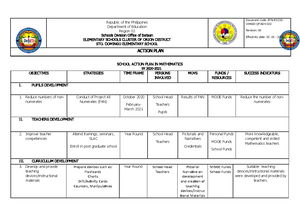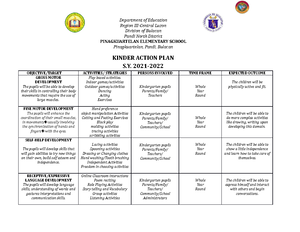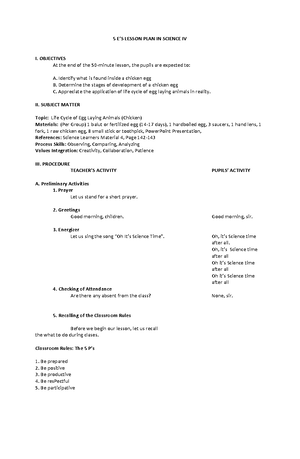- Information
- AI Chat
DLP Intro. Philo. WEEK 1
Education
Bohol Island State University
Recommended for you
Preview text
Daily
Lesso
n
Plan
School Southern Masbate Roosevelt College, Inc. Grade 12 Teacher Leynard James M. Unciano Subject Introduction to the Philosophy of the Human Person
Semeste r 1 st Semester Quarter/Week 1 st Quarter/Week 1
I. OBJECTIVES
a. Content Standard The learner understands the meaning and process of doing philosophy b. Performance Standard
The learner reflects on a concrete experience in a philosophical way
c. Learning Competencies/Objec tives Write the LC code for each
Most Essential Learning Competencies: 1. Distinguish a holistic perspective from a partial point of view PPT11/12-Ia-1. 2. Recognize human activities that emanated from deliberate reflection PPT11/12-Ib-1. At the end of this lesson, the learners are expected to:
1. discuss the meaning, characteristics
and branches of philosophy;
2. distinguish a holistic perspective from
a partial point of view;
3. reflect why people philosophize; and
4. discuss the importance of philosophy
in their lives.
a. discuss the meaning of philosophy b. identify the branches of philosophy;ssss c. appreciate the significance of the characteristics of philosophy.
II. CONTENT The Meaning and Branches of Philosophy III. LEARNING RESOURCES A. References 1. Teacher’s Guide Pages 2. Learner’s Material Pages 3. Textbook Pages
INTRODUCTION TO THE PHILOSOPHY OF THE HUMAN PERSON, Christine Carmela R. Ramos, PhD Pages 2 - 6 4. Additional Materials from Learning Resource (LR) Portal B. Other Learning Resources
Paper Tarpaulin Chalk Pictures Speaker
IV. PROCEDURES Teacher’s Activity Student’s Activity A. Reviewing Previous Lesson or Presenting the new Lesson
The teacher will show pictures “Are you familiar with these symbols? What are they?”
“Do you know the meaning of these symbols?”
Yes, Yin Yang and a Lotus Flower
Answers may vary
B. Establishing a Purpose for the Lesson
The teacher will ask the students, “What words come to your mind when you hear the word Philosophy?”
Answers may vary
C. Presenting Examples/Instances of the new Lesson
Before dwelling to the new lesson, the teacher will ask the following questions and call a student to respond to each
- What is knowledge?
- How do we know?
- What is good?
- What is freedom?
Answer may vary Answer may vary Answer may vary Answer may vary
The people who engages in philosophy are called Philosopher.
Doing Philosophy - Is a way of understanding the things that we experience every day of our life. It is a practical knowledge that we can use every day.
Characteristics: - Just as there are many ways at looking at things, like, experiences, situations, problems, Philosophy can also be seen and treated in different ways. Philosophy can be seen as a, as and framework an examination of knowledge as a discipline. (Abella 2016) - Whenever a person encounters a problem, situation or a question life, he or she often goes back to his or her framework in order to make sense of the problem. A framework is defined as a way of thinking about the world and is composed of views and beliefs of a person. (Abella 2016). Philosophy then as a framework could lead the person to come up with something that may pave the way for solutions or answer. The framework of Philosophy aids the personal framework of the person. Philosophy can also be treated as an examination of a particular area of knowledge. This means that the principles of philosophy can be used as an examination of other disciplines or areas of knowledge. In the long run, other areas of specialization may benefit from the very nature of philosophy, (Abella 2016). Lastly, Philosophy in itself is a distinct area of knowledge. It has its own goals, concerns and ways of doing things, (Abella 2016). Definitely, philosophy is a discipline in itself.
After the discussion, the teacher will give an activity about the topic to the students.
Activity # What words come now to your mind when you hear the word Philosophy? On a ½ sheet of paper, copy the graphic organizer and write the words in the blank circles.
PHILOSOPHY
FRAMEWORK DISCIPLINE
EXAMINATION OF KNOWLEDGE
E. Discussing New Concepts and Practicing Skills #
BRANCHES OF PHILOSOPHY
Logic - It comes from the Greek word logike, coined by Zeno the Stoic (c-265BC), which means matters pertaining to the human thought. - Reasoning is the concern of the logician. - a branch of philosophy that deals with the nature of thinking and reasoning using empirical support and information which are reliable, valid and objective. o it is the science of correct thinking. - Some Philosophers that used logic: Aristotle – First philosopher to devise a logical method. Truth means the agreement of knowledge with reality. Logical reasoning makes us certain that our conclusions are true. Zeno of Citium – One of successor of Aristotle and founder of Stoicism Other authors of logic – Cicero, Porphyry, Boethius, Philoponus and Al- Farabi, Avicenna, and Averroes - Two Types of Logic a. Deductive Reasoning – from a general truth to specific truth, from universal truth to particular. b. Inductive Reasoning – from a specific truth to general truth, particular to universal.
Epistemology - It deals with nature, sources, limitations, and validity of knowledge. - It explains: (1) how we know what we claim to know; and (3) how we can differentiate truth form falsehood. - Sources of Knowledge: 1. Induction – gives importance to particular things, seem, heard, and touched.
- it is concerned with the essence of perception of beauty and ugliness.
- It is important because of the following: It vitalizes our knowledge. It makes our knowledge of the world alive and useful. It helps us to live more deeply and richly. A work of art helps us to rise from purely physical existence into the realm of intellect and the spirit. It brings us in touch with our culture. The answers of great minds in the past to the great problems of human life are part of our culture.
- Hans – Georg Gadamer – A German philosopher who argues that our tastes and judgements regarding beauty work in connection with one’s own personal experience and culture. Our culture consists of the values and beliefs of our time and our society.
General Questions in Philosophy Philosophy is concern with the deepest and widest questions in life. A. Epistemology Theory of Knowledge – - What is knowledge? - Can we know? - What is to know? - How can we know? B. Ethics Moral Philosophy – - What is freedom? - Do we have free will? - What is human act? - Are our actions already determined? C. Philosophy of Art Aesthetics – - What is beauty? - What does it mean to be beautiful? D. Philosophy of Religion - Does God exist? - Can we prove the existence of God? - What reasons are there to believe in God? E. Rational Psychology/Philosophy of Man/ Philosophical Anthropology • What is the essence and meaning of life? - Does life make sense? - What is good life? - What is happiness?
- What is man? Who is man?
- Is man only his body, or man is his soul
Philosophy is reflective and reflections arise from our experiences. Man is rich with experiences both good and evil. These experiences are the starting point of wonder and awe. Reason leads to reflection and that’s what makes us human. We are capable of becoming aware of our consciousness and daily activities. Man, by essence is reflective. However, people nowadays have less time to think and reflect on their experiences. Man is simply now becoming a contradiction of his own. (Garcia 2016)
Activity # Activate the philosopher in you by formulating your philosophical questions to each branch of philosophy. BRANCH OF PHILOSOPHY PHILOSOPHICAL QUESTION Metaphysics Epistemology Ethics Aesthetics F. Developing Mastery Activity #3. Cabbage ball. The teacher will pass on the cabbage ball from one student to another and when the music stops, the one holding the ball peels the outer layer of the cabbage ball, read the question and answer it within 30 seconds. The cabbage ball contains 7 questions.
Questions: 1. What is philosophy?
- It is an organized body of knowledge and it is systematic.
- The word Philosophy comes from the two Greek words ____ and _____
- Is a way of understanding the things that we experience every day of our life.
- An African – American who wanted equal rights for the blacks.
- He claims that everything we experience that is reality and everything else is appearance.
- It deals with nature, sources, limitations, and validity of knowledge.
Answers:
Philosophy is also defined as the science that by natural light of reason studies the first causes or highest principles of all things.
Science
Philos (love) and Sophia (Wisdom)
Doing Philosophy
William Edward Burghardt Du Bois
Thales
Epistemology
G. Finding Practical Applications of Concepts and Skills in
GROUP ACTIVITY. Brain Storming The teacher will divide the class into 3 and let the students answer the question located inside the card given to them.
a. Logic b. Aesthetic c. Epistemology d. Ethics
From a general truth to specific truth, from universal truth to particular. a. Induction b. Deduction c. Deductive Reasoning d. Inductive Reasoning
The Greek term for philosophy, philosophia, means ___. a. Holistic Thinking d. Partial Thinking c. Love of wisdom d. Knowledge J. Additional Activities to Application or Remediation
The teacher will ask the students to do an advance reading in “Why become a philosopher? On Attaining a Comprehensive Outlook in Life”
V. REMARKS VI. REFLECTION A. No. of learners who earned 80% in the evaluation B. No. of learners who require additional activities to remediation who scored Below 75% C. Did the remedial lessons work? No. of learners who have caught up with the lesson. D. No. of learners who continue to require remediation E. What difficulties did I encounter which my principal or supervisor can help me solve? F. What innovation or localized materials did I used/ discover which I wish to share with other teachers?
DLP Intro. Philo. WEEK 1
Course: Education
University: Bohol Island State University

- Discover more from:EducationBohol Island State University999+ Documents
- More from:EducationBohol Island State University999+ Documents














